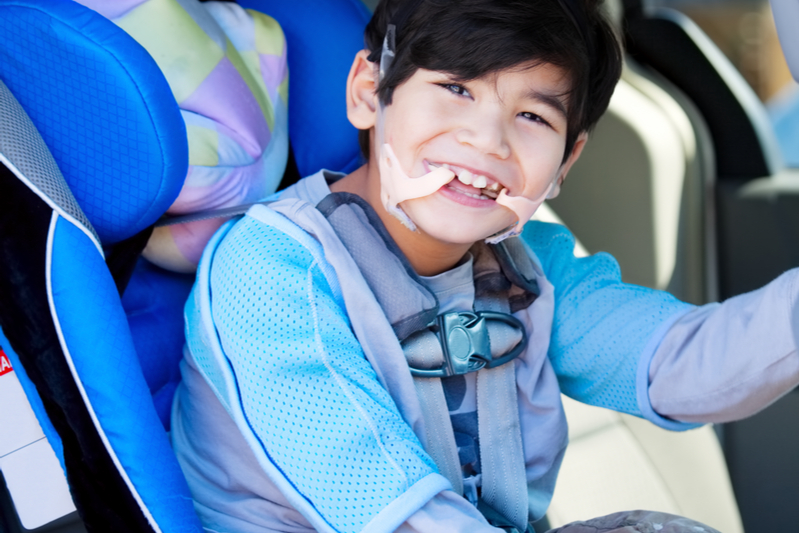A child with special needs deserves to travel as much as any other child and so do their families. But traveling with a child with special needs means lots of planning, and in some cases, bringing along lots of special equipment. For this reason, many parents of children with special needs prefer road travel when taking a family vacation. Unlike air travel, driving allows you to pack more supplies, and make multiple stops along the route whenever needed. Traveling with young children by car is also fun because travelers can enjoy the scenery and stop to explore popular attractions.
Based on a study by NCBI, children traveling with complex and chronic health conditions are a vulnerable group of travelers. Not to mention that road-tripping with kids with special needs presents challenges that can fluster even the most experienced caregiver. Some parents, for example, may be navigating busy highways and unfamiliar routes, while dealing with hours’ long meltdowns.

While road-tripping is probably the best method of travel for the child with special needs, no method of travel is without its difficulties. Here are some pros and cons of traveling with the special needs child:
Pros of Travel for Children With Special Needs
- Travel actively boost mental and physical health when trips are planned carefully and correctly
- Travel can bring about a real improvement in your child’s social skills
- Travel takes your child out of their comfort zone and enhances their life experiences
- Travel can create special memories you will all cherish forever
Cons of Traveling with Special Needs Kids
- Planning a trip can occasionally limit parents if they need to be near medical facilities at all times.
- There will need to be a high degree of planning for every eventuality and this sometimes affects spontaneity.
- If your child becomes ill, you may have to pay for treatment depending on the country you’re visiting.
- If your child is upset or distressed, it can be anxiety-provoking for everyone—including the child.
Ready to take the travel plunge? Here are some tips to help families with a special needs child have the best and most memorable family car trip possible:
Planning Is Key
While spontaneity is fun, when you have a child with special needs, planning a road trip is crucial for the successful journey. In the months before your travel date, take the time to research possible destinations and map out routes to accommodate the needs that are unique to your child. Look for hotels suitable for kids with special needs. Check on details such as accessibility, security, and any amenities that might enhance your child’s comfort. Figure out what items you will need to pack for mealtimes, bedtime, and bath time.
In choosing your accommodations, draw up a list of several possibilities and make calls to get an idea of what is available for the guest with special needs. If your child is allergic to specific foods, for example, look for a hotel that will allow you to cook food in your room. Such hotels generally provide a microwave, mini-fridge, and cooktop, so you can cook your child’s preferred meals with ease. If your desired hotel doesn’t meet your child’s needs, ask them to recommend other area lodgings.
Prepare the Child with Special Needs for the Road Trip
Kids with developmental disabilities, in particular, tend to act out whenever their schedule is disrupted. Even the slightest change can result in upsets and meltdowns. To ensure your child enjoys every bit of your trip, get them excited about the adventure.
Start by talking about the upcoming vacation in advance to help them adjust their routine and set expectations for the journey. You might create a child-friendly storybook that highlights details of the trip, and then read it aloud together. Alternatively, using colorful crayons, create a simple map with details of the fun outdoor activities you will engage in and the beautiful sights you will see and explore on the road trip.

Consult Your Child’s Doctor
Before setting out on a family road trip, you will want to be sure all is safe for your child with special needs. Some children cannot travel far because they need frequent medical checkups. For this reason, always discuss any travel plans with your child’s physician. If your doctor approves your travel plans, don’t be shy about any questions you might have, for instance, regarding nutrition tips for your child or a special travel pack. It may be helpful to request a detailed list of your child’s current prescription medications.
Ask the doctor for a letter describing your child’s conditions and requirements in case of emergency. Be sure to write down and keep handy the contact details of your child’s physician and any recommendations for specialists in the region you plan to visit. That way, you’ll have an easy time getting medical assistance if your child falls ill while on the road. Another important consideration is your health insurance. Reviewing your medical insurance policy can help you avoid extra stress due to the requirement of many policies for pre-approval before use in out-of-town hospitals.
Plan for Multiple Stops
When mapping your road trip route with Google Maps or road trip planning apps, plan for multiple stops. Stopping after one or two hours can reduce anxiety or stress caused by being confined for too long in the car. A stop also creates room for you and the kids to use the bathroom, eat lunch, or enjoy snacks. You can take advantage of stops along the road to stretch your legs or visit a tourist attraction site your child might want to explore. If there are no attractions at a specific spot, consider going to a nearby playground to enjoy some outdoor games with the kids.

Prioritize Car Safety
Your goal as a parent is to enjoy a stress-free road trip and arrive safely at your destination. For this reason, you’ll want to take all the necessary precautions to stay safe on the road. Note that keeping special needs travelers safe requires varied equipment and practices, depending on the specific needs of the child. First, of course, you must install the right adaptive car seats to ensure your child is comfortable and safe throughout the journey.

While installing adaptive car seats is enough to enhance car safety, some kids might require specialized restraints. Vests, harnesses, and restraints make it difficult for kids to unbuckle their seat belts. If you have a child living with a sensory processing disorder, restraining them with weighted vests or tight-fitting straps can help calm them. Also, use your vehicle’s safety features, such as the child lock, to prevent kids from opening car doors. Having a back seat child monitor is a good idea to keep an eye on your kid with ease. And don’t forget to check your car’s engine oil, tire pressure, and other maintenance issues beforehand.

Avoid Sensory Overload
Many kids with autism, cerebral palsy, and Down syndrome tend to be very sensitive to their surroundings. This sensitivity can cause sensory overload, resulting in distress and meltdowns. When your child is easily overstimulated, road trips, even short ones, can be challenging. This is because crowds, noise, and bright lights can trigger sensory overload. Your child will also throw tantrums if they haven’t adjusted to the idea of traveling.
One way of preventing overstimulation in special needs kids is through management and prevention of sensory overload. You can do this by using sensory processing kits like earplugs or headphones for blocking noise. Sensory fidgets are ideal for keeping your kid’s hands busy, and sunglasses prevent exposure to bright lights.
Experts also recommend self-soothing strategies for children subject to sensory overload. Self-soothing strategies include deep breathing, taking a walk, and counting to ten. Make sure to practice these soothing techniques before traveling. That way, your child will know what to do when they start to experience sensory overload.
Taking breaks from crowded or stressful environments is another excellent trick for ensuring your kid stays calm during a trip. For example, let’s say you’re out for an excursion, and your child starts to feel overwhelmed. Find a quiet place like a private room or restroom where there is less stimulation in order to help your child relax.
Don’t Forget the Essentials for Your Child with Special Needs
Packing for a kid with special needs can be challenging, especially when traveling to unfamiliar places. As a general rule of thumb, you shouldn’t forget any item that’s essential for your child’s well-being. Therefore, create a packing checklist to reduce the chances of leaving anything behind. Make sure to pack prescription medicine that your child takes every day, a first aid kit, and an extra change of clothes in a separate bag. Place these items in the front of the car to avoid having to dig through your luggage when you need them.

Remember to bring your kid’s favorite stuffed animal, sensory toy or device, pillow, or blanket. With these essentials, you can create a familiar environment in the car or hotel room. As a result, your child will feel comfortable and less anxious about traveling. As you pack these items, use a permanent marker to write your contact details on them. This trick makes it easy to find your kid’s essentials if you forget them somewhere. Nonetheless, make it a habit to double-check your child’s bag before leaving a spot. Doing so reduces the chances of forgetting or losing items.

Keep the Kids Entertained
Navigating busy roads and unfamiliar terrain with kids can be stressful. But that shouldn’t be the case if you plan for entertainment. Consider packing coloring books, hand-held games like Rubik’s cube and ball mazes, or interactive books with hidden pictures, flaps, or stickers. You’ll also want to pre-load your tablet with new and old games, or TV shows to keep the kids occupied while you drive.
Prepare your child’s favorite playlist, including soothing instrumental songs to enhance relaxation when your child feels overstimulated. You can include car games the entire family can play based on the things you see on the road. Think of bingo, license plate games, and the alphabet game. Keeping children entertained in the car helps kill boredom and prevents them from distracting you while you drive.
Road trips are fun and convenient while guaranteeing the freedom to pack more important items and make multiple stops along the way. However, traveling with a special needs child by car can be hectic if you don’t prepare well in advance. Children with special needs experience meltdowns when their routine changes even slightly. Exposure to bright light, noise, and crowds cause sensory overload due to their hypersensitivity.
To make road trips enjoyable for kids who need special care, plan for multiple stops, enhance car safety, and pack the right toys and appropriate snacks. Don’t forget your child’s medication. And finally, be sure your plans include plenty of entertainment to keep you’re the whole family, including the child with special needs engaged, and happy, and calm. Now watch this road trip be the best one ever, for all concerned, bar none!
